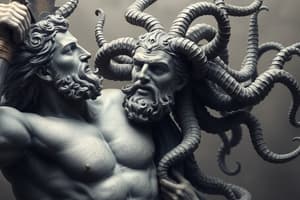Podcast
Questions and Answers
What unique physical features are often depicted in images of Medusa?
What unique physical features are often depicted in images of Medusa?
- Boar's tusks and snakes for hair (correct)
- Horns and scales
- Golden hair and bright eyes
- Wings and claws
The myth of Medusa has only been recognized for a few centuries.
The myth of Medusa has only been recognized for a few centuries.
False (B)
What does Medusa's gaze do to those who look at her?
What does Medusa's gaze do to those who look at her?
It petrifies them.
Medusa represents an image of a powerful woman who can __________ a man with a single look.
Medusa represents an image of a powerful woman who can __________ a man with a single look.
Match the following descriptions with the aspects of Medusa's myth.
Match the following descriptions with the aspects of Medusa's myth.
What was Medusa's status before her transformation into a monster?
What was Medusa's status before her transformation into a monster?
Athena punished Medusa for the act of rape committed by Poseidon.
Athena punished Medusa for the act of rape committed by Poseidon.
What significant change happened to Medusa after her encounter with Poseidon?
What significant change happened to Medusa after her encounter with Poseidon?
Medusa's ability to turn people to stone is a result of her ________ transformation.
Medusa's ability to turn people to stone is a result of her ________ transformation.
Match the following characters with their roles in Medusa's story:
Match the following characters with their roles in Medusa's story:
What can happen to someone who looks directly at a Gorgon like Medusa?
What can happen to someone who looks directly at a Gorgon like Medusa?
Acrisius, the king, was pleased to learn that his daughter had given birth to a son.
Acrisius, the king, was pleased to learn that his daughter had given birth to a son.
What shape did Zeus take to approach Danae?
What shape did Zeus take to approach Danae?
Medusa is often viewed as a symbol of _____ in Greek mythology.
Medusa is often viewed as a symbol of _____ in Greek mythology.
Match the following characters to their descriptions:
Match the following characters to their descriptions:
Flashcards are hidden until you start studying
Study Notes
The Myth of Medusa
- Medusa was once a beautiful priestess of Athena, goddess of war, bound by a vow of chastity
- Poseidon, god of the sea, raped Medusa in Athena's temple, a sacrilegious act
- Athena transformed Medusa into a monstrous Gorgon, with snakes for hair and a gaze that turns any living being to stone
- Athena's punishment of Medusa reflects ancient Greek society's views on women as property, blaming the victim instead of the perpetrator.
The Origin of Medusa's Appearance
- The Gorgon's appearance, with wide-opened eyes, bloated face, and protruding tongue, is inspired by the look of a human corpse in decomposition
- Death was a common, visible occurrence in ancient Greece and many historical monsters were modeled on corpses.
- Examples are found in Aztec mythology, Egyptian mythology, and Southeast Asian mythology.
The Hunt for Medusa's Head
- Medusa became a target for warriors seeking to claim her head and its petrifying power as a weapon
- Perseus, a demigod son of Zeus and Danae, was destined to kill Medusa
- Perseus's journey to slay Medusa is one of mythology's greatest adventures.
Perseus's Birth
- Perseus's father, Zeus, was a prolific womanizer, often seduced women in various ways.
- Perseus's father, Zeus, seduced Danae in the form of golden rain, possibly due to his namesake, the Persean meteor shower.
- Perseus was born a demigod, meaning he held divine powers and was destined for heroic deeds
- Acrisius, Perseus's grandfather, was terrified by a prophecy that Perseus would kill him and thus, he threw Danae and Perseus into the sea to prevent this.
The Significance of Medusa
- Medusa's image was used to ward off danger, appearing on armor and objects such as stoves to prevent children from touching them.
- Medusa's petrifying power is the origin of the phrase "looks that kill," conveying the impact of a forceful stare.
- The name Medusa actually had a positive connotation in the ancient Greek language, meaning guardian.
The Myth of Perseus
-
Perseus is a young man without a father, who is a social outcast in ancient Greece. He is tasked with bringing the head of Medusa to the king in order to save his mother from an unwanted marriage.
-
Medusa is a Gorgon, a monstrous creature with snakes for hair. Anyone who looks directly at her is turned to stone. Her story is rooted in the myth of Perseus, who eventually slays her.
-
The myth of Perseus and Medusa is associated with the ruins of Mycenae, an ancient city-state in Greece. It was believed to be founded by Perseus himself.
-
Perseus is aided by the gods in his quest to slay Medusa. Hermes gives him winged sandals, allowing him to travel long distances quickly.
-
The Graeae Sisters, three old women who share one eye, know the location of the Stygian Nymphs, who possess the weapons Perseus needs to kill Medusa. Perseus steals the sisters’ eye in order to force them to tell him where to find the nymphs.
-
The story of Perseus's quest is believed to be inspired by constellations visible in the night sky. The constellation of Perseus features a hero holding a curved sword and the head of a Gorgon, representing the myth.
-
Algol, a dim star in the Perseus constellation that appears to dim and brighten periodically, inspired the story of the Graeae Sisters. It is an eclipsing binary star, with two stars orbiting each other.
-
The Stygian Nymphs, who live on the River Styx, provide Perseus with weapons for his battle with Medusa: the sword of Zeus, the shield of Athena, and the helmet of Hades.
-
Perseus uses Athena's shield to his advantage, allowing him to look at Medusa’s reflection instead of at her directly. This way, he could avoid turning to stone.
-
After killing Medusa, Perseus successfully turns the king to stone, saving his mother from unwanted marriage. He returns the head of Medusa to Athena.
-
The myth is seen as a story about a hero who defeats great monsters by relying on his courage and ingenuity.
Studying That Suits You
Use AI to generate personalized quizzes and flashcards to suit your learning preferences.





